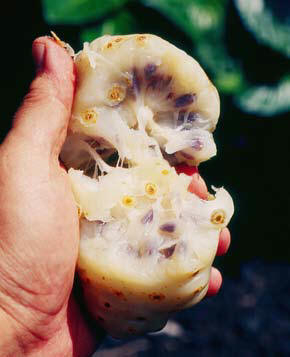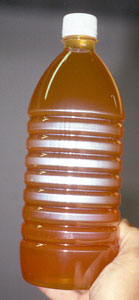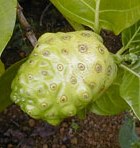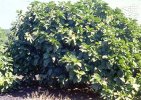Medicinal Uses
One of the many uses for Morinda citrifolia is for its medicinal properties. In fact, many cultures in Burma and Australia this fruit is a vital part of their diet. Polynesian healer used this plant for thousands of years to prepare effective remedies to various health challenges.
In a study looking at M. citrifolia in Costa Rica and its anti-inflammatory and anti-oxidative effects, Noni juice showed that it reduced inflammation in rats significantly due to the presence of flavonoids, coumarins, iridoids and vitamin C. (Click here to read article) Flavinoid, along with anthroquine and other alkaloids, seemed to also help treat HIV and AIDs. In fact, Noni is used in the Indian system to cure many disease including HIV.
Treatments and "Cures"

Polynesian healers used the noni fruit a lot for
various ailments. To learn more
Click Here.
Noni plants have a lot of potential in the medical world. Because of the nutrients the noni fruit posses, it's used to treat a variety of health problems including, high blood pressure, arthritis, ulcers, depression, sprains, menstrual cramps, pain relief, inflammation, burns, fever, food poisoning, intestinal worms, and joint problems. Noni was used by Polynesia traditional healers for the treatment of cuts, bruises and wounds. A poultice made from noni leaves are commonly used topically for wounds; the unripe fruit is used for mouth sores, gingivitis, toothaches, and abscesses. It's actually thought that Chinese immigrants may have introduces their medicinal techniques to use the ripened noni fruit for internal ailments. This "miracle fruit" said to help stimulate the immune system to help fight off the cancer, though it only kills a small percentage (about 36% maximum) of the cancer cells.
Fruit juice from noni fruit supposedly treats diabetes and hypertension. This is due to a alkaloid xeronine found by Ralph Heinicke, a biochemist that was living in Hawaii working for Dole Pineapple Company. This alkaloid is similar to the active substance of an unknown ingredient in a pineapple enzyme.
What's in Noni?
 The
noni contains many vitamins, minerals, enzymes, and
beneficial alkaloids. In fact, it contains a very
important alkaline, xeronine. Xeronine is found in
all the cells of microorganisms, plants, animals,
and humans. This alkaloid plays a fundamental role
in the function of all body cells and allows
proteins to carry out all their individual duties.
The
noni contains many vitamins, minerals, enzymes, and
beneficial alkaloids. In fact, it contains a very
important alkaline, xeronine. Xeronine is found in
all the cells of microorganisms, plants, animals,
and humans. This alkaloid plays a fundamental role
in the function of all body cells and allows
proteins to carry out all their individual duties.
Because the xeronine works with endorphins to ease pain and cause a sense of euphoria, it's the bodies supreme pain killer and a rather effective sedative. Though many people acquire xeronine in their diets, some scientists worry that this may not be enough. Many nutrients we acquire from our foods is being lost due to poor soil and unhealthy crops, and a lack of this essential alkaline can cause illness. Not only does this plant contain xeronine, but also proxeronine, which is better. Proxeronine is the precursor to xeronine and allows the body to control how much xeronine is produce, while the rest is lost as waste. This allows the proteins in the body to do what they were designed to do. Noni also contains essential amino acids in its roots and leaves.

Noni also contains a chemical called damnacanthal in its roots. Damnacanthal has been found to be effective in successfully changing cancer cells back to normal cells, supposedly. A study with mice with cancer showed that when treated with noni they lived longer. A clinical trial done by the University of Hawaii was aimed at trying to collect more information about the use of noni as an anti-tumor medicine and identify the chemicals in the noni fruit that exhibit these properties. (Check It Out!!)
Noni as Food
 Morinda
citrifolia is common in the diet of many
cultures and used as a famine food in some countries. Noni
juice is the common form of consumption and is found
in 10% to 100% concentrations. Homemade juice is a
good way to get 100% noni juice. Just place fullly
ripened noni fruit in glass jar with a very small
amount of water. Then seal it tightly, and let it
sit for 1 week to 3 months so the contents have time
to naturally decompose and ferment. Finally strain
the juice through a cheesecloth and store in the
refrigerator. NOTE: Noni juice is usually mixed with
other juices to make it taste better; noni fruit are
not notorious for tasting the best. In fact, noni
trees tend to smell bad when producing their fruit,
similar to gingko trees.
Morinda
citrifolia is common in the diet of many
cultures and used as a famine food in some countries. Noni
juice is the common form of consumption and is found
in 10% to 100% concentrations. Homemade juice is a
good way to get 100% noni juice. Just place fullly
ripened noni fruit in glass jar with a very small
amount of water. Then seal it tightly, and let it
sit for 1 week to 3 months so the contents have time
to naturally decompose and ferment. Finally strain
the juice through a cheesecloth and store in the
refrigerator. NOTE: Noni juice is usually mixed with
other juices to make it taste better; noni fruit are
not notorious for tasting the best. In fact, noni
trees tend to smell bad when producing their fruit,
similar to gingko trees.
WARNING: YOU SHOULD NOT USE NONI FOR
MEDICINAL PURPOSES WITHOUT CONSULTING YOUR DOCTOR
FIRST!!!
Noni can interfere with some medication you might be
taking, such as coumadin or warfarin. People with
potassium-restricted diets should avoid eating Noni
due to liver, kidney and heart problems.

